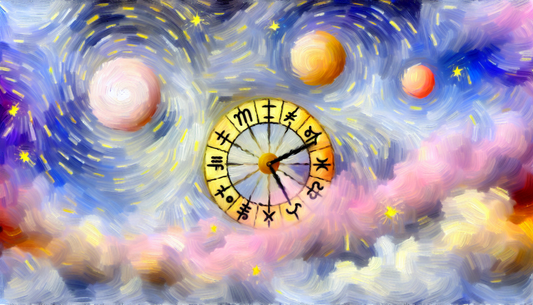Astrology is a fascinating blend of art and science, shrouded in symbolism and intrigue. For many, it serves as a tool for self-discovery, providing insights into personality traits, relationships, and even life’s challenges. If you’re a novice eager to explore this captivating realm, you’re in the right place. Let’s embark on this cosmic journey together.
Understanding the Basics of Astrology
Astrology traces its roots back thousands of years, originating in Babylonian civilizations. Its essence lies in the belief that celestial bodies - such as planets and stars - affect human affairs and natural phenomena. At its core, astrology emphasizes the relationships between these celestial movements and our earthly experiences.
The primary building blocks of astrology are the twelve zodiac signs, each associated with specific personality traits and tendencies. When considering your birth chart, or natal chart, take into account not just your sun sign - the sign you probably see in horoscopes - but also your moon sign and rising sign. Together, these create a more nuanced understanding of your astrological identity.
Learning About the Zodiac Signs

The zodiac is divided into twelve signs, each occupying a distinct 30-degree segment of the sky. The signs are further classified into four elements: fire, earth, air, and water, which adds another layer of meaning to their characteristics.
- Aries (March 21 - April 19): Energetic leaders, often impulsive and daring.
- Taurus (April 20 - May 20): Grounded, practical, and lovers of beauty and comfort.
- Gemini (May 21 - June 20): Curious and adaptable, with a love for communication.
- Cancer (June 21 - July 22): Nurturing, sensitive, and protective of loved ones.
- Leo (July 23 - August 22): Charismatic and passionate, typically seeking the spotlight.
- Virgo (August 23 - September 22): Detail-oriented and analytical, preferring order and cleanliness.
- Libra (September 23 - October 22): Diplomats and peacekeepers, valuing relationships and aesthetics.
- Scorpio (October 23 - November 21): Intense and mysterious individuals with deep emotional currents.
- Sagittarius (November 22 - December 21): Adventurous and philosophical, often pursuing freedom.
- Capricorn (December 22 - January 19): Ambitious and disciplined, focused on goals and success.
- Aquarius (January 20 - February 18): Inventive and humanitarian, often thinking outside the box.
- Pisces (February 19 - March 20): Empathetic dreamers with a strong connection to emotion and imagination.
Getting to know these signs can help you understand yourself and the people around you better.
The Importance of the Natal Chart
Your natal chart is essentially a snapshot of the sky at the precise moment of your birth. It showcases the positions of the planets and how they interact with each other, providing valuable insights into your personality and life path. To create your natal chart, you’ll need your birth date, time, and location. There are numerous free online tools that can generate this chart for you.
In addition to your sun, moon, and rising signs, your chart contains dozens of aspects to consider, including the twelve houses which represent various life areas such as relationships, career, and personal growth. Understanding these components can enhance your awareness of how astrological influences shape your life.
Basic Astrological Tools
To delve deeper into astrology, consider investing in a few essential tools.
- Books: There’s a wealth of literature on astrology ranging from beginner guides to in-depth analyses of complex topics. Look for renowned authors like Steven Forrest or Robert Hand.
- Websites & Apps: Platforms such as Astro.com or apps like Co-Star and The Pattern provide personalized insights based on your natal chart, keeping you informed about current astrological events.
- Community: Engage with others through online forums, social media groups, or local meet-ups. Sharing insights and experiences can further your understanding.
- Journaling: Tracking your thoughts, feelings, and events in relation to astrological phases - like the moon's cycles or planetary retrogrades - can illuminate patterns in your life, deepening your connection to the cosmic rhythms.
Practicing Astrology in Daily Life
Incorporating astrology into your daily routine can enhance your self-awareness and decision-making. Here are a few simple ways to do this:
- Moon Phases: Use the moon’s phases as an opportunity for personal introspection or goal-setting. For instance, the new moon is an excellent time for setting intentions, while the full moon can serve as a period for reflection and release.
- Astrological Forecast: Consider developing a habit of reading daily or weekly horoscopes for insights and guidance. This can help you navigate both challenges and opportunities in alignment with celestial events.
- Mindfulness: Embrace mindfulness exercises that center around your connection to the universe. Meditate on your astrological placements or engage with nature, grounding yourself in the present while fostering a cosmic connection.
Final Thoughts
Exploring astrology as a beginner is an exciting journey that offers many layers of self-understanding and growth. With a combination of reading, practice, and community engagement, you can create a robust foundation that allows you to explore the cosmic landscape and make sense of each phase of your life through the stars. Whether you approach it with curiosity, skepticism, or a sense of wonder, astrology holds the potential to enrich your everyday existence in ways you may have never imagined. Happy stargazing!















